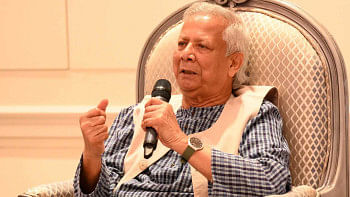Access to healthcare, justice still a far cry
A person's identity defined by South Asian societies based on class, caste and gender results in the unequal access to healthcare, livelihood, shelter and justice, said speakers at a regional conference in the capital yesterday.
The two-day South Asian regional conference titled “Gender, Rights and Choices: Access to Justice in a Megacity”, is being organised jointly by Dhaka University law department and Bangladesh Legal Aid and Services Trust (BLAST) at Senate Bhaban of DU.
DU Vice Chancellor Prof Md Akhtaruzzaman inaugurated the conference where lawyers, government officials, researchers, and activists of rights organisations from home and abroad are participating. The conference aims to assess the overall status of access to justice and healthcare in the region.
Financial division in the society and prejudice towards women and other marginalised groups such as the transgender people are major impediments in ensuring access to healthcare, employment and justice for all, the speakers said.
The authorities concerned often do not cooperate with the marginalised people, especially women, contributing to the perpetuation of violence against them. Moreover, women -- who had been victims of different forms of violence including early and forced marriages, dowry and rape -- lack the awareness of their rights, the speakers also said.
Eminent lawyer Dr Kamal Hossain said the law has immense power and it needs to be enforced properly, irrespective of gender and social class.
“A judiciary that operates independently should ensure the welfare of all people in the country,” said Dr Kamal, a senior advocate of the Supreme Court.
Prof ASM Amanullah of sociology department at DU said following the “Shokhi” campaign undertaken by BLAST at slums of Dhaka with assistance from the Netherlands embassy, about 90 percent or more households in the slums have become aware of their rights.
According to a recent poll of 19 megacities, Dhaka ranked the seventh worst megacity for women and it was the fourth worst city for women facing the risk of sexual violence and harassment.
Only eight One-stop Crisis Centres for women at district levels is highly inadequate, said Ayesha Afroz Chowdhury of health and family welfare ministry.
DU VC Prof Akhtaruzzaman urged lawyers, academicians and social activists to work together to uphold gender equality, social justice and women empowerment.
Shayla Ahmed, a medical team leader of Maya Apa; Geeta Menon, a rights activist from India; Leoni Cuelenaere, ambassador of the Netherlands; Prof Rahmat Ullah, dean of law faculty at DU; Barrister Sara Hossain, honorary executive director of BLAST, and Attorney Marlon Manuel, a senior advisor of Global Legal Empowerment Initiative; also spoke.

 For all latest news, follow The Daily Star's Google News channel.
For all latest news, follow The Daily Star's Google News channel. 



Comments